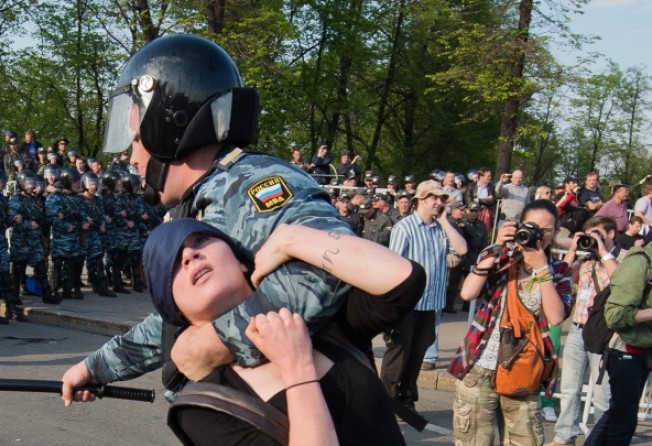Russia braces for trial of violent anti-Putin protesters

Twelve Russians go on trial in Moscow on Thursday accused of crowd violence at a mass protest against President Vladimir Putin last year in what critics say is a political show trial aimed at destroying the nascent opposition movement.
Going on trial are participants in what the Kremlin has called “mass riots” on Bolotnaya square in central Moscow during an opposition rally on May 6, last year, one day before Putin was inaugurated into his third presidential term.
The trial comes as the most charismatic protest leader Alexei Navalny is in court accused of causing a loss to a regional government in an obscure timber deal. After declaring his desire to stand for president, he will be unable to stand for office if he is convicted.
The Bolotnaya case involves 27 people. Two have confessed and have been sentenced to 4 1/2 years and 2 1/2 years in prison. Most of the others have languished in pre-trial detention for nearly a year.

However upon reaching the square, the crowd encountered a massive police presence. Most of those marching never reached the stage and many panicked after spending hours in the sun and finding themselves unable to follow the agreed route.
The Bolotnaya case involves 27 people. Two have confessed and have been sentenced to 4 1/2 years and 2 1/2 years in prison.
Though it is disputed who struck the first blow, clashes between protesters and police led to dozens of injuries, overturned portable toilets, the use of pepper spray and hundreds of arrests.
Investigators have described what happened as premeditated mass riots that aimed to stoke unrest in the country, but an independent report by Russian human rights groups in April concluded that the clashes were provoked by the authorities.
Those going on trial this week range from 19-year-old anarchist Alexandra Dukhanina to 51-year-old physicist Sergei Krivov.
One defendant Denis Lutskevich, a former marine, was taken to hospital in an ambulance after the rally with head injuries and his back striped red from riot police batons. He was arrested a month later.
Also going on trial are Andrei Barabanov, 22; Stepan Zimin, 21; Alexei Polikhovich, 22; Yaroslav Belusov, 21; Artyom Savelov, 34; Vladimir Akimenkov, 25; Nikolai Kavkazsky, 26; Maria Baronova, 29, and Leonid Kozyavin, 26.
None are well-known figures of the opposition movement, and for some such as Lutskevich, the rally on May 6 was their first.
“The goal of this case is to scare,” Lutskevich’s lawyer Dmitry Dinze said. “Investigators took one person from each social group and put them in jail... to start this trial. They are showing people that anyone can be prosecuted for being in a protest.”
“We have a lot of evidence that there were no mass riots,” he added, “but we may have an expedited trial where the defence will not be allowed to show this evidence.”
Ahead of the trial, state television released secret camera footage alleging that the clashes at the rally were organised by several opposition leaders together with a Georgian lawmaker, using money from the United States.
“The goal was to shed blood, to provoke mass unrest and lots of deaths,” a pro-Kremlin lawmaker and deputy chairman of the Duma lower house, Sergei Zheleznyak, said in a show on Rossiya television last month, the second highest-rating channel.
He alleged that the activists aimed to destabilise the government and give the United States an excuse to use “emergency measures” against Russia.
Rights campaigner Lev Ponomaryov said the trial aimed “to prove that these were mass riots, to give everyone long jail terms, and to accuse the opposition of calling for mass riots and receiving foreign money”.
He compared the case to a series of trials held after a mass protest rally in ex-Soviet Belarus in 2010, which all but completely silenced the critics of authoritarian President Alexander Lukashenko.
“This is the first big political trial of Putin’s Russia,” Ponomaryov said. “It has to set a precedent to wipe out political opposition.”